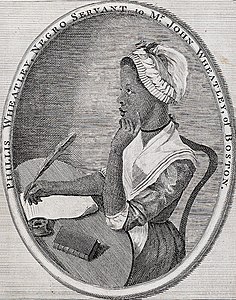Analysis of On Virtue
Phillis Wheatley 1753 (West Africa) – 1784 (Boston)
O Thou bright jewel in my aim I strive
To comprehend thee. Thine own words declare
Wisdom is higher than a fool can reach.
I cease to wonder, and no more attempt
Thine height t' explore, or fathom thy profound.
But, O my soul, sink not into despair,
Virtue is near thee, and with gentle hand
Would now embrace thee, hovers o'er thine head.
Fain would the heav'n-born soul with her converse,
Then seek, then court her for her promis'd bliss.
Auspicious queen, thine heav'nly pinions spread,
And lead celestial Chastity along;
Lo! now her sacred retinue descends,
Array'd in glory from the orbs above.
Attend me, Virtue, thro' my youthful years!
O leave me not to the false joys of time!
But guide my steps to endless life and bliss.
Greatness, or Goodness, say what I shall call thee,
To give me an higher appellation still,
Teach me a better strain, a nobler lay,
O thou, enthron'd with Cherubs in the realms of day.
| Scheme | ABCDEBFGHIGJKLMNIOPQQ |
|---|---|
| Poetic Form | |
| Metre | 1111001111 101111101 1011010111 1111001101 11101110101 1111110101 1011101101 11011101011 1101111010 1111010101 01011111 0101010001 110101001 0101010101 0111011101 1111101111 1111110101 10110111111 1111100101 1101010101 11111000111 |
| Closest metre | Iambic pentameter |
| Characters | 910 |
| Words | 167 |
| Sentences | 12 |
| Stanzas | 1 |
| Stanza Lengths | 21 |
| Lines Amount | 21 |
| Letters per line (avg) | 34 |
| Words per line (avg) | 8 |
| Letters per stanza (avg) | 710 |
| Words per stanza (avg) | 166 |
Font size:
Submitted on May 13, 2011
Modified on May 03, 2023
- 51 sec read
- 507 Views
Citation
Use the citation below to add this poem analysis to your bibliography:
Style:MLAChicagoAPA
"On Virtue" Poetry.com. STANDS4 LLC, 2024. Web. 29 Apr. 2024. <https://www.poetry.com/poem-analysis/29377/on-virtue>.


Discuss this Phillis Wheatley poem analysis with the community:
Report Comment
We're doing our best to make sure our content is useful, accurate and safe.
If by any chance you spot an inappropriate comment while navigating through our website please use this form to let us know, and we'll take care of it shortly.
Attachment
You need to be logged in to favorite.
Log In